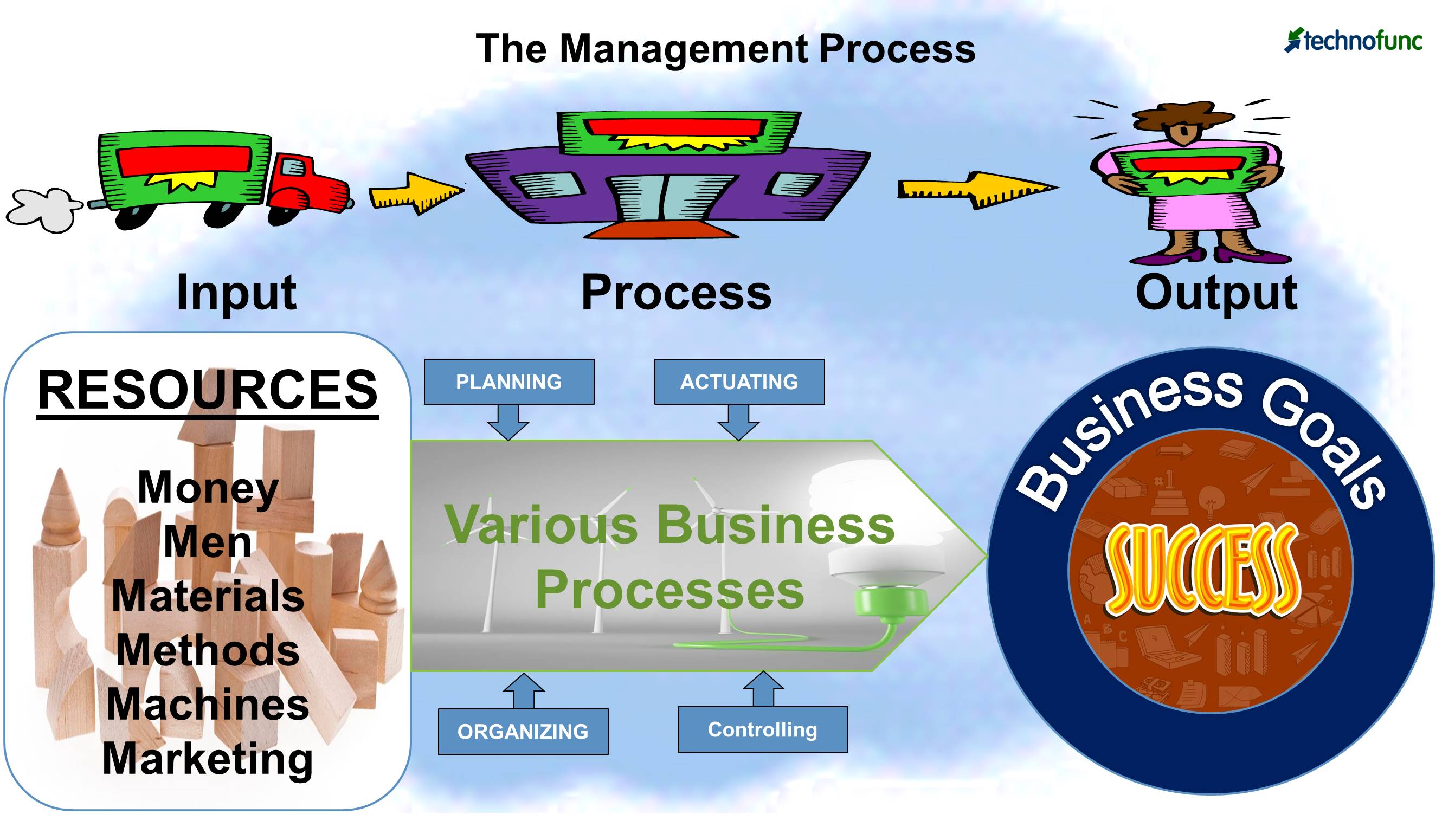- Home
- Business Processes
- Industry Knowledge
- Aerospace Industry
- Automotive Industry
- Banking Domain
- BFSI Industry
- Consumer/ FMCG Industry
- Chemicals Industry
- Engineering & Construction
- Energy Industry
- Education Domain
- Finance Domain
- Hospitality Domain
- Healthcare Industry
- Insurance Domain
- Retail Industry
- Travel and Tourism Domain
- Telecom Industry
- Leadership Skills
- eLearning
- Home
- Leadership Skills
- Leadership & Management
- Concept of Management
Concept of Management
The concept of management refers to the process of planning, organizing, staffing, directing, coordinating, and controlling to achieve organizational goals. It is the management of human, physical, financial, and other valuable resources of the organization in an effective and efficient manner to achieve business objectives.
Different people have conceived and defined management in different ways. But, the essence of management lies in determining worthwhile goals and then carefully selecting and utilizing resources through efficient and effective planning, organizing, actuating, and controlling to achieve those goals.
Who is a Manager?
You are a manager. What does this mean? The word derives from the ancient French word for handling horses and a later one for handling the affairs of the kitchen. Cynics might replace horses with donkey, but all would see the analogy of keeping an organization alive through the activities of the kitchen. Probably the one that is most simple, popular, and often quoted by many in general is "getting things done through other people."
Let us now look at different definitions that highlight important aspects of management.
- Management is a distinct process consisting of activities of planning, organizing, actuating and controlling, performed to determine and to accomplish stated objectives with the use of human beings and other resources (Martin, 1977).
- Good management is merely the exercise of common sense and the Golden Rule (Daniel, 1976)
- The six M’s (money, men, materials, methods, machines, and marketing) of management or the basic resources, as they are often called, are subjected to the fundamental functions of management - planning, organizing, actuating, and controlling -to achieve stated objectives.
- Management is an art struggling to become a science.
- Management science is a body of systematized knowledge accumulated and accepted with reference to the understanding of general truths concerning management.
- The art of management is a personal creative power plus skill in performance. The contemplation of problems, events, and possibilities develops personal creative power, while experience, observation, and study of results contribute to skilled performance. It other words, management art involves envisioning an orderly whole from chaotic parts, communicating the vision, and achieving the goal. It is the "art of arts" because it organizes and uses human talent (Boehringer, 1975)

From these definitions, we can infer that the principles and the techniques of management are not only applicable to the business world but they can be equally applied universally. They also find application in social, religious, charitable, and non-profit organizational contexts.
Essentially we can conclude that management is the integration of human and other resources in a manner that leads to effective utilization and harmonization of the individual efforts with organizational goals.
Suggested Reading and Resources
Related Links
You May Also Like
-
Process & Stages of Creativity
Creative ideas do not come just like that. There is a process to it. There are a number of techniques of creativity to support the generation of ideas but the widely practiced ones are brainstorming and lateral thinking. Most innovations are not so much the product of sudden insights as they are the result of a conscious process that often goes through multiple stages. The creative process can be divided into four stages of preparation, incubation, evaluation, and implementation.
-
All the teams are dynamic in nature and they take time to come together, they form, develop, and grow in stages, over a period of time. Teams go through five progressive stages: Forming, Storming, Norming, Performing and Adjourning. In this article, we want to introduce you to these stages of team development and certain strategies that you can use to help the team grow and develop in each of these stages.
-
Team leadership theory is a recent leadership theory that does not discriminate between the leader and the other team members. The approach considers contributions from each team member to be critical for organizational success. This approach focused on the overall team effectiveness and team problems are diagnosed and action is taken to remediate weakness. This approach provides for taking corrective action when the leader deems necessary.
-
There are four characteristics of leadership that help us to understand the character of leadership as a concept. 1. Leadership is a process, 2. Leadership involves influence, 3. Leadership always occurs in a group context and 4. Leadership involves goal attainment. These are the four components that make up the character of the 'leadership' term and help us to define the leadership concept. All of these components of leadership have common characteristics.
-
Managers have to perform many roles in an organization, and how they handle various situations will depend on their style of management. Management styles are the characteristic ways, of making decisions relating to subordinates. These are the strategies, efforts, or direction used by the manager, to create an efficient workplace, to achieve organizational goals. A management style is the method of leadership used by a manager.
-
Tools for Developing Your Team
If a manager has too many weak spots in the talent of the team, the ability to empower the team members to independently execute the project is impaired. Assignments fall behind schedule or stretch out because the needed skills or knowledge are not in place when needed. To successfully execute important projects, hiring talented people, and increasing the talents of existing staff are most important.
-
In today's innovation-driven economy, understanding how to generate great ideas has become an urgent managerial priority. Managers need to encourage and champion ideas and need to help their organizations incorporate diverse perspectives, which spur creative insights and facilitate creative collaboration by harnessing new technologies. Innovation is the embodiment, combination, and/or synthesis of knowledge in original, relevant, valued new products, processes, or services.
-
Hawthorne Studies - Leadership
The Hawthorne studies were conducted on workers at the Hawthorne plant of the Western Electric Company by Elton Mayo and Fritz Roethlisberger in the 1920s. This study established the behavioral change that happened due to an awareness of being observed, resulting in active compliance with the supposed wishes of researchers, because of special attention received, or positive response to the stimulus being introduced.
-
At different points in your professional career, it is helpful to identify your core values. Values are the qualities considered to be the most important guiding principles that determine the priorities in your life and greatly influence your career choices. Your career brings happiness when it is in agreement with the beliefs you have about what is important and meaningful to you. Awareness of your values will help you develop a clearer sense of what's most important to you in life.
-
The best career choices are ones that match your values. Each person has several values that are important to him. These values are highly personal and knowing them provides a clearer sense of what's most important to you in your life and career. Career values are the beliefs you consider important from a work standpoint. Values help you understand what you want from a job? Explore a few examples of work values that can influence career path and job satisfaction.
Explore Our Free Training Articles or
Sign Up to Start With Our eLearning Courses

About Us
Learning
© 2023 TechnoFunc, All Rights Reserved










